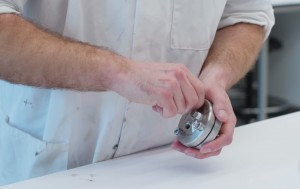Reducing the energy costs of gas separation
30 March, 2021

Dr Matthew Cowan assembling a cell for testing the mixed-gas permeation of new membrane materials.
For Dr Matthew Cowan it’s all about working to make a difference for the environment. The MacDiarmid Institute Associate Investigator is developing technology he hopes will cut the amount of energy used to produce many common consumer products.
A senior lecturer in chemical and process engineering at the University of Canterbury, Dr Cowan is leading a project developing energy saving alternatives to the industrial gas separation and purification processes currently used to produce key raw materials used in plastics and chemicals.
The project received a $300,000 Marsden Fund Fast-Start grant in 2020 to explore creating the new membrane technology that could replace the current energy intensive distillation methods used to produce materials such as polyethylene and polypropylene.
Dr Cowan and his collaborators in Aotearoa New Zealand and internationally are examining ways to fabricate the metalorganic framework (MOF) membranes to be used in the process of gas separation.
"My whole idea behind these MOF membranes was to separate these gases without having to boil them and we should therefore be able to use much, much less energy to do that separation process," he says.
Dr Cowan’s goal is to reduce the amount of energy we need to use every day to slow climate change and make lives richer.
That’s why I got into this (research). I wanted to make a difference for the environment and climate change.
Dr Matthew Cowan Associate Investigator University of Canterbury
But he is also a passionate believer in “getting research to where people can use it. That is the whole point.’’
He says some rough calculations suggest that globally the energy used separating these materials is between three and five times the amount of energy Aotearoa New Zealand uses every year.
“So I thought if we can save half that amount of energy then we can save a Aotearoa New Zealand’s worth of energy and the carbon emissions associated with that.”
The MOF membranes act like a molecular sieve. A pressure differential is created with high pressure on one side of the membrane and low pressure on the other and the gas flows from the high pressure area to the low pressure area.
The process can be used to separate ethylene from ethane or propylene from propane and that gas can then be purified. Current processes for gas separation are energy-intensive, complex and expensive.
He acknowledges the biggest challenge and the focus of the project is fabricating the membranes, but he says the research team has made some progress.
Dr Cowan is also pursuing other technological solutions to these energy intensive distillation processes. He is collaborating with researchers in Texas, USA, on the potential of adsorbent materials for use in gas separation.
“They have sent us some materials to test including one last year, a completely new material made specifically for this project, that produced some exciting results.’’
“Results from testing using this material featured on the covers and as a research articles in the International Edition of the prestigious scientific journal Angewandte Chemie and ChemSusChem.”
Dr Cowan sees this work as part of a possible suite of solutions to the issue of reducing energy use alongside MOF membranes. To cap a busy year Dr Cowan also presented at Parliament at the Speaker’s Science Forum which aims to present new research to MPs and decision-makers to inform the issues being addressed in Parliament.
His presentation ‘Hidden Energy: Revolutionising hidden high-energy processes’ focused on his research around improving the methods and technologies we use to purify all the building blocks of society.
The kai we eat is separated from the earth, the water we drink is purified of bacteria, and our cutlery is shaped from metal refined from ore. Amazing amounts of energy are hidden in the objects all around us.
Dr Matthew Cowan Associate Investigator University of Canterbury


